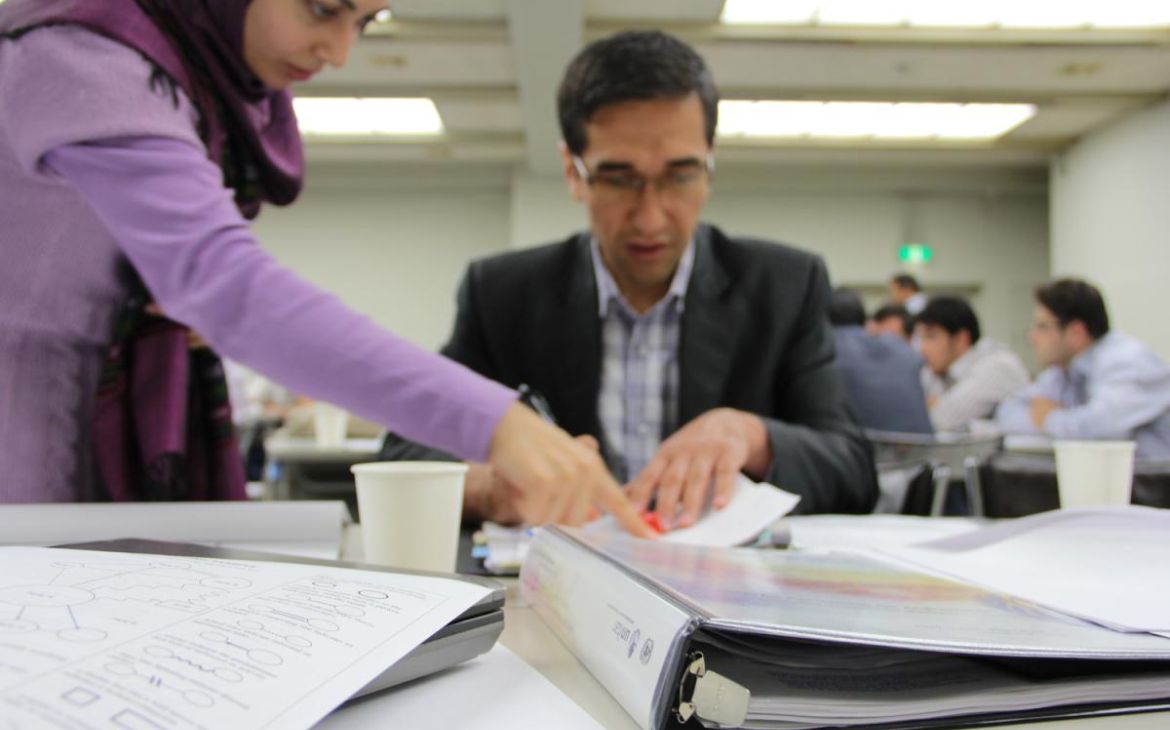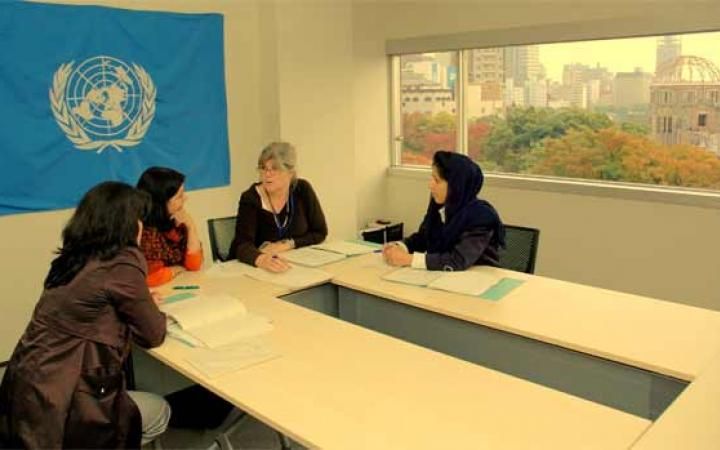About the Fellowship
The UNITAR Afghanistan Fellowship Programme - Inspiring Transformation discusses important themes related to the effective governance of Afghanistan by and for Afghan nationals themselves, a crucial requirement for the future of the nation following the elections in 2014. The 2016 Cycle of the Fellowship underwent a strategic review and restructure. Some elements below may refer to previous cycles of the Fellowship.
These include:
- Organizational Development
- Organizational Change
- Project Design
- Project Management
- Human Resource Development
- Human Resource Management
- Accounting and Budgeting
- Leading and Mentoring Teams for Development and Change
- Team-building and Teamwork
- Communication Skills
- Strategic Planning
The Fellowship seeks to contribute to sustainable learning in the workplace and to build on the capacity of the Afghan civil service as it works to rely on its own ability and lessen its need to depend on the human resources and expertise provided by the international community.
Since its launch in 2003, the Fellowship is currently in its fourteenth cycle, with a total of over 500 participants having taken part.
Learning Objectives
The Fellowship’s two long-term objectives are:
a. To support Fellows in the application of their new knowledge and greater confidence to the transformation of their respective ministries and organizations through:
- Achievement of mandates and objectives despite limited resources;
- Facilitating effective team work and coordination within the organization through mentoring and teambuilding;
- Networking and collaborating with stakeholders and other organizations;
- Leadership and management of capacity building;
b. To build a committed and highly capable Fellowship community in Afghanistan which can serve as a resource for planning and implementing capacity-building and training activities at the local and national levels.
Methodology
PEOPLE
The Fellowship utilizes several layers of reinforcement and continued learning, allowing for the development of a committed, indigenous community, contextualizing the themes of the programme for the changing landscape within Afghanistan. These mutually reinforcing layers include;
FELLOWS
- First time participants in the programme. Fellows are the main beneficiaries of the cycle, and are divided into groups at the beginning of the Fellowship.
COACHES
- Coaches are selected from the stand-out Fellows of previous cycles and are tasked with providing unity and guidance to the group.
- Coaches are also responsible for being the main contact point between Mentors and the groups as a whole.
- Coaches receive additional “Coaching-for-Coaches” training so that they may continue their professional development while being equipped with the skills to coach their group.
AFGHAN RESOURCE PERSONS (ARPS)
- Selected from the stand-out Coaches of previous cycles, ARPs act as apprentice faculty and work to contextualise the training being offered to the changing realities in Afghanistan.
- ARPs are offered further training in a module specifically designed for them, examining social entrepreneurship.
MENTORS
- Mentors are experts, practitioners or academics in various disciplines.
- They are individuals willing to volunteer and share their knowledge, to guide and advise where requested, and are comfortable in a two-way learning relationship.
- The Mentors/Mentor teams, together with the Coaches will be asked to commit to overseeing at least one group of five to six ‘mentees’ for the duration of each Cycle.
- Mentors may also act as Resource Persons.
RESOURCE PERSONS
- Resource Persons provide the main presentations for the programme and attend workshops, either in-person or electronically.
PROCESS
Throughout the Fellowship process, participants utilize the training offered in a number of assignments and projects, which are both peer-, and Mentor-reviewed. This serves to reinforce the themes of the Fellowship programme, and instill a learning-by-doing element in the training architecture.
TEAM PROJECT WORK
- ASSIGNMENT I
- Each Fellow undertakes an organization/needs assessment in her/his workplace for one of the following purposes:
- To determine the needs and service requirements of a population or customer group served by the Fellow’s organization;
- To determine the capacities and priority needs of the Fellow’s organization in order to more effectively support the organization’s mission; or
- To determine the capacities and priority development needs of a particular group of employees within the organization (e.g., supervisors, engineers, scientists, teachers, secretaries, etc.)
In the weeks in between Workshop I and Workshop II, Fellows are offered guidance by UNITAR’s team of Mentors, Coaches and Afghan Resource Persons. Following individual presentation of the findings of Assignment One at Workshop II, each team uses the results of the organization needs assessments to decide on a team project.
- ASSIGNMENT II
- Assignment II sees teams tasked with developing a concept paper in the form of a high-level Project Plan. Elements of the Fellowship covered in Workshop II contribute greatly to the development of Assignment II. This process also is focused upon by the Coaches, ARPs and Mentors, and discussed at length during Audio Conferences.
- ASSIGNMENT III
- Assignment III calls for the development of a team project plan for organizational development or change projects for Afghanistan. Through a formal presentation involving all group members, a report is made upon the development of a detailed project plan for the team’s organizational development or change project as developed through Assignments I and II.
PERFORMANCE
The Fellowship sees three Workshops held throughout the process, two in Kabul, and one in Hiroshima, Japan.
Other Methodological Highlights
CURRICULUM EMPHASIS ON LEADERSHIP AND MENTORING:
Endeavouring to widen the impact of the Fellowship, UNITAR has placed special emphasis on methodology and skill development related to leadership and mentoring. The objective in this respect is to develop the capacity of each Fellow to be a leader and facilitator able to contribute to organizational and Human Resource Development within his/her respective ministry or organization.
The outcomes of the projects undertaken by most of the teams over the last few cycles indicate that this objective was met with a considerable degree of success. Special efforts have also been made to ensure the Fellows’ team projects focus on management of change and organizational development, and the necessary skills and knowledge to support the process have been included as the recurring themes throughout the Cycle curriculum.
COMBINATION OF DIFFERENT TRAINING METHODS:
The Fellowship undertakes a combination of different training methods with a series of skill-building activities, including:
- On-site workshops
- Study-trips
- Mentor/ARP/Coach/Fellow communication
- Team projects
- Distance learning activities
VIDEO SEMINARS
Throughout the Fellowship, Video Seminars link Fellows, as a group, to Resource Persons around the globe. Presentations delivered during such events correspond to the phase in the Fellowship at which the Fellows find themselves and have included, amongst others:
- Tools For Maximising Performance
- Training As A Capacity Development Tool
- Conflict Resolution
- Leadership Development
- Risk Identification and Mitigation
- Results Based Management
AUDIO CONFERENCES
All groups are connected via Skype to both UNITAR and their Mentors every 4 weeks so that the project and Fellowship process can be discussed. Standing as milestones in the programme, these conferences are augmented by ad-hoc discussions between group members, Coaches, ARPs and Mentors.
COACHING FOR COACHES MODULE
The Coaching for Coaches Module starts before the official launch of the Fellowship. To facilitate the Coaches’ responsibility of guiding the Fellows through their assignments, the first six web-based sessions are conducted prior to the official launch of the Fellowship to ensure they are prepared in time. The topics covered include:
- Coaching and Mentoring Skills
- Team-building
- Gatekeeping
- Conflict Resolution
- Motivation
- Management of Productive and Effective Meetings
Two subsequent web sessions conducted during the Fellowship Cycle primarily focus on the challenges faced by Coaches thus far. Prior to each session, Coaches are given assignments and background reading. They are also asked to manage and facilitate the Fellowship Orientation work shop, as well as After-Action Reviews (AARs) at all Workshops. As a final requirement Coaches, along with the ARPs are asked to organize a Cycle De-briefing Seminar.
ARP TRAINING MODULE: SOCIAL ENTREPRENEURSHIP
A crucial element in the UNITAR Hiroshima Office methodology is the continuing facilitation of learning and skill-building for our ARPs. Launched in 2013, the ARP Training Module on Social Entrepreneurship, subtitled “Solving Social Issues by Creating Innovation, Jobs, Social Leaders and Global Citizens” encourages ARPs to analyse the skills and insight they have gained in the previous two iterations of the Fellowship, and how this can be utilized to develop their own leadership legacy, and outline ways in which this can be utilized to solve a social issue.



